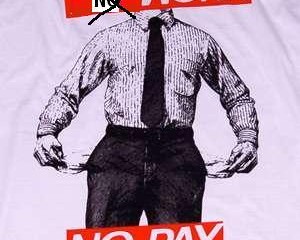East Midwest Music Group Releases Debut Album “Shuffle” for VH1 Save The Music Foundation
We sat down with East Midwest Music Group last week to talk about – you guessed it – being a broke musician. Let’s preface this piece by mentioning that the things that we’ve learned in our ‘pow-wow’ could easily apply to all performers, freelancers and generally people who don’t have money. Not only was there an opportunity to discuss the details of their compilation album Shuffle, we also had a chance to take into account the assets that all broke musicians have… that’s right, you have assets. We’re not just talking about your expensive instrument, sheet music collections, your head shots, or your Metrocard, we’re talking about the extensive list of qualities that you ultimately possess (whether they are fully cultivated or not) to create a lasting career in this modern day wild, wild west that we call the entertainment industry.
East Midwest Music Group is one part Ben Lindell, one part Doug Larsen, and one part Garret Philbin. The three friends turned business partners met while attending the University of Miami’s Frost School of Music from 2004-2008. Lindell and Larson majored in Media Writing and Composition while Philbin, who acts as manager and oversees all business affairs for the team, studied Music Business and Entertainment Industry.
Over the course of the past two years, East Midwest Music Group has made a name for themselves by collaborating with a slew of local artists on demos, EPs and albums, creating baller Youtube video covers (check out their channel at http://www.youtube.com/user/EastMidWestMusic), while simultaneously pitching their original work to major label artists. It is worth noting that things have not happened overnight for the trio and continue to build slowly. “The goal is to work with our friends,” says Lindell as we casually conversed in Midtown Manhattan’s Smash Studio’s, where the bulk of Shuffle was recorded. And from the looks of EMW’s ambitious effort, it pays to have friends.
Shuffle is a collaborative effort between East Midwest Music Group (EMW), VH1’s Save The Music Foundation and 14 artists including Roshon, star of the Disney Channel’s Camp Rock and Shake It Up, Amanda Brown from NBC’s The Voice, Colombian recording artist Camo and newcomers Tatiana Owens, Sam Nulton and Bobby Brickstone among others. All proceeds from Shuffle will be donated to the charity and for every $30,000 the team raises VH1 can purchase instruments to help restore music programs in schools. Purchases can be made exclusively online with a ‘set your own price’ option.
Let’s do a little word problem shall we: if EMW and 14 artists created one compilation album over a 6 month period with all of the proceeds going to charity, how much money will EMW and the 14 artists receive? If you guessed zero, congratulations! If you guessed anything else, we really need to talk. And how did EMW convince 14 recording artists ranging from multiple genres and multiple stages in their career to take a chance on this project? By taking advantage of their assets, and that’s where you come in.
Over the course of 6 months, Shuffle’s involvement grew from two producers and 10 artists to over 100 people including graphic designers, event coordinators, interns, assistants, managers, publicists, advisers and many more. “It was a lot of bartering and a lot of sweat equity.”, notes Larson. The album has grown from a track listing, to a private album release party which took place in Manhattan’s Lower East Side to a completion of a wrapped video for the single “15 seconds of fame” by Johnny Burgos, all on a minimal monetary budget. In fact, Shuffle is the first album in history to donate all of its proceeds to the VH1 Save The Music Foundation.
We’ve all seen, started or been a part of projects that have fallen apart whether it be fundraising campaigns for our records, music videos, stage productions and so forth. The unfortunate truth is that we are cultivated to believe that we as independent artists need lots of money to complete our projects and catch a break. Many artists become frustrated, stop completely or simply leave their projects unfinished. EMW spent two years witnessing this firsthand having sold their music, production skills and songwriting expertise to artists that did not see their projects through to completion. EMW, like any other producer, band or singer, needed the material to gain traction and catch the attention of bigger names. “We’re not getting calls from Beyonce,” says Lindell. Which is understandable, Beyonce still doesn’t reply to my tweets either. However, EMW took these roadblocks as an opportunity to learn some important lessons on how to really get shit done.
EMW didn’t simply use their financial capacity to complete this project. They didn’t make calls to family members begging to participate in crowd-funding. Instead, they drew from qualities that every musician already has, but may not have accounted for. EMW realized something that all musicians need to know: by taking into account their motivation, goals, time and a network of contacts, money would no longer become a deciding factor in the future of one’s project. So with a little help from EMW, let’s discuss how you can take these assets – one’s that you already possess – into account.
Lindell stressed to me the importance of having the right motivation for Shuffle, which consequently needed to rub off on everyone involved. I asked them about their goals for the charity project and to my surprise money, fame and stardom were not in the picture. “The goal for this project is to raise as much money as possible,” said Lindell, and it’s that simple. Obviously there are benefits if the project takes off: exposure for the producers and the artists alike, new additions to the team’s growing body of work and the continuous cultivating of valuable relationships. However, there is no underlying scheme to get ahead. A motivation that simply involves that matter at hand prevented the team from creating lofty, unrealistic goals that had nothing to do with the project. There’s nothing wrong with seeing the big picture but focusing on the matter at hand for the time being is a conscious effort that should be considered. “Align motivations. I cannot stress that enough,” Lindell commented. Creating the understanding that the charity is their bottom line opened the floodgates for all of the other artists and people involved to join them in their efforts without any hidden agendas. It’s absolutely crucial to understand your own motivation and your teams’ motivations to make sure everyone is on the same page.
The answer made me wonder about EMW’s future. I asked, “What are your plans for East Midwest?” Larson simply replied with, “West Midwest.” Clearly the group has thought about expansion, but with a comprehension of what is important today and what will matter tomorrow. “There’s goals that we can attain in the present and then there’s goals we can attain in the future. Leaving a legacy is not something we can accomplish right now.” Lindell added. When you’re a musician with dreams of superstardom, it’s easy to lose track of what your goals actually are. To put it into perspective, EMW realized that Rome wasn’t built in a day. Leaving a legacy is a plan for the group posthumously, while giving to charity and working with friends has become a more pressing matter. As musicians, we must constantly make sure we are keeping track of our goals the same way you’d keep track of the money in your bank account. The close observation of their goals along with a tight schedule helped EMW complete Shuffle in a tight six month period. More than money, EMW paid for their debut record with something that we are given each and every day: time.
Even though we don’t all have the same amount of money, the advantage that we are all given is that we all have the same amount of time. We are all given 24 hours a day, seven days a week. No more, no less. Managing and spending their time to complete this project, including multiple meetings with different members involved as the team grew, studio time with the artists, mixing multiple versions of each track and checking what was most likely an endless amount of emails, is what probably costs the most. “How much time do you think you’ve spent on this record?” I was itching to hear the response. “Aww man,” said Lindell. Larson, seated to my left, simply let out a heavy sigh. The expressions alone were enough to gauge an answer. “Probably hundreds of hours,” Lindell replied shaking his head. As much as we would like to think that people can buy time, cut corners or create conveniences, spending your time working hard is what ultimately will make a music project sink or swim.
In the real world things come up, like bills. Most musicians and performers tend to work on the freelance side of things which left me wondering how EMW got around their other obligations. Lindell, who also works as the head engineer of Smash Studios, started charging more money for his services. His logic was that he had to put a larger price on his time in order to keep Shuffle as a priority. The clients that wanted his services stayed and the others simply did not. Both Lindell and Larson’s bodies of work are extensive as they have not only spent time on the record, but also many years developing their services. We have to ask ourselves what our time is truly worth based on our capability and skill level. Afterwards, demanding a higher rate won’t seem as scary. Time must be spent long term as well as short term.
The other side of spending time can be summarized in a question; how long are you willing to wait? “There was always a plan B,” Lindell says. “If Save The Music didn’t work out, we’d go to [another charity].” By plan B, we’re not talking about your shitty restaurant job that you work, just for the money. We’re talking about using your critical thinking skills to complete a project. If one approach didn’t work, EMW moved onto the next, instead of simply waiting for things to fall into place. It’s a slippery slope, but when you’re budgeting your time it’s a necessity.
Motivation, time and goals are all crucial determining factors that can help in deciding the fate of your music project. And each of these points can lead to what may be the most important piece of this self-actualizing puzzle. We all have one, but we may not all be aware of how to take advantage of it. The hard truth is that none of us can do it alone. The most important thing EMW may have done to make Shuffle work is to build, sustain, utilize and account for their network.
The interesting thing about EMW’s project is that everyone played their part as a piece of the puzzle. The team was very aware early on of what they could feasibly accomplish on their own and what they’d need assistance doing. EMW knew they were not photographers or graphic designers. They are music producers. So when it came time to outsource for different pieces of the puzzle, EMW wasted no time reaching out to people they’d worked with in the past. By using the previously mentioned assets: aligning the correct motivation and expressing exactly what the purpose of the project was, assessing their short and long term goals, and spending and budgeting their time, it became much easier to involve other people. It also didn’t hurt that EMW spent a lot of man-hours making sure that their pitch to VH1 Save The Music Foundation was impeccable.
The truth of the matter is that you can’t do everything. Expecting yourself to write the music, raise the money to record the music, create partnerships with other professionals, compose contracts, write and send out press releases, design a logo and a website, market and promote the product and still have time for the rest of your life simply isn’t feasible. At the risk of sounding cheap (pun intended) your network is your net worth.
Using the resources you already possess will likely become essential for all musicians’ success as the ‘formula’ for success continues to change at a rapid fire pace. However, when you take these crucial elements into account you too can likely build a ‘foundation’ of your own (I just couldn’t resist).
East Midwest Music Group’s debut album Shuffle is available everywhere visit https://emwshuffle.org/vip for more information about the album and donation information.
Photo Credit: emwshuffle.org









